Essay on the Impacts of Social Media on Students' Lives and Society
VerifiedAdded on 2021/06/16
|9
|1939
|21
Essay
AI Summary
This essay examines the multifaceted impacts of social media on students and society. It explores the rise in social media usage, citing statistics on user numbers and internet penetration. The essay delves into both positive and negative effects, including the potential for improved academic performance through educational use, while highlighting the negative consequences such as poor academic performance, depression, and reduced interpersonal skills. It references studies on the correlation between excessive social media use and psychological distress, cyberbullying, and addiction, comparing it to drug addiction. The essay also discusses how social media can reduce face-to-face interactions, making people less sympathetic. The conclusion suggests moderation and constructive use of social media, with recommendations for parental and teacher guidance on responsible usage. The essay emphasizes that the benefits or detriments depend on how it is used and recommends moderation.
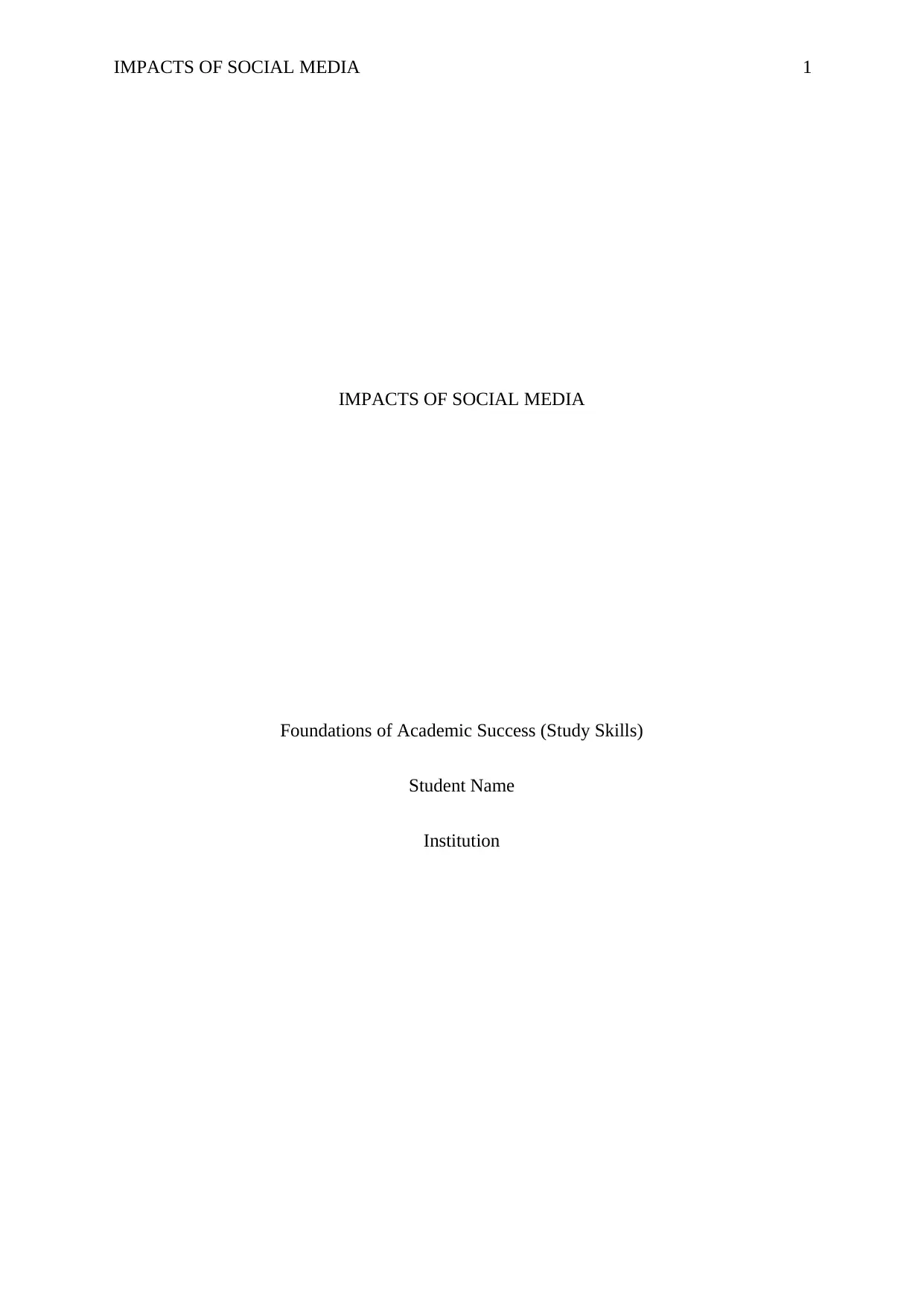
IMPACTS OF SOCIAL MEDIA 1
IMPACTS OF SOCIAL MEDIA
Foundations of Academic Success (Study Skills)
Student Name
Institution
IMPACTS OF SOCIAL MEDIA
Foundations of Academic Success (Study Skills)
Student Name
Institution
Paraphrase This Document
Need a fresh take? Get an instant paraphrase of this document with our AI Paraphraser
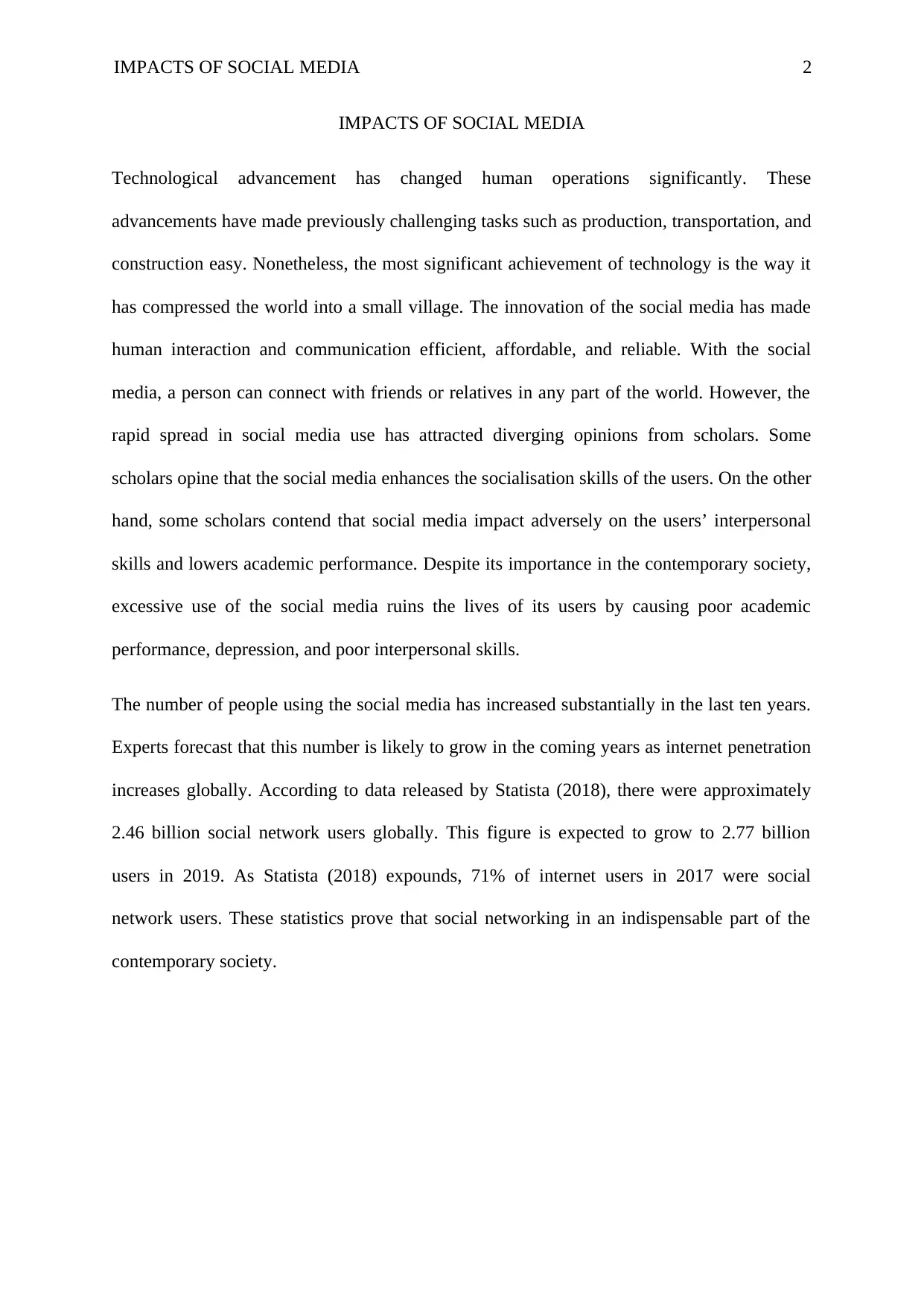
IMPACTS OF SOCIAL MEDIA 2
IMPACTS OF SOCIAL MEDIA
Technological advancement has changed human operations significantly. These
advancements have made previously challenging tasks such as production, transportation, and
construction easy. Nonetheless, the most significant achievement of technology is the way it
has compressed the world into a small village. The innovation of the social media has made
human interaction and communication efficient, affordable, and reliable. With the social
media, a person can connect with friends or relatives in any part of the world. However, the
rapid spread in social media use has attracted diverging opinions from scholars. Some
scholars opine that the social media enhances the socialisation skills of the users. On the other
hand, some scholars contend that social media impact adversely on the users’ interpersonal
skills and lowers academic performance. Despite its importance in the contemporary society,
excessive use of the social media ruins the lives of its users by causing poor academic
performance, depression, and poor interpersonal skills.
The number of people using the social media has increased substantially in the last ten years.
Experts forecast that this number is likely to grow in the coming years as internet penetration
increases globally. According to data released by Statista (2018), there were approximately
2.46 billion social network users globally. This figure is expected to grow to 2.77 billion
users in 2019. As Statista (2018) expounds, 71% of internet users in 2017 were social
network users. These statistics prove that social networking in an indispensable part of the
contemporary society.
IMPACTS OF SOCIAL MEDIA
Technological advancement has changed human operations significantly. These
advancements have made previously challenging tasks such as production, transportation, and
construction easy. Nonetheless, the most significant achievement of technology is the way it
has compressed the world into a small village. The innovation of the social media has made
human interaction and communication efficient, affordable, and reliable. With the social
media, a person can connect with friends or relatives in any part of the world. However, the
rapid spread in social media use has attracted diverging opinions from scholars. Some
scholars opine that the social media enhances the socialisation skills of the users. On the other
hand, some scholars contend that social media impact adversely on the users’ interpersonal
skills and lowers academic performance. Despite its importance in the contemporary society,
excessive use of the social media ruins the lives of its users by causing poor academic
performance, depression, and poor interpersonal skills.
The number of people using the social media has increased substantially in the last ten years.
Experts forecast that this number is likely to grow in the coming years as internet penetration
increases globally. According to data released by Statista (2018), there were approximately
2.46 billion social network users globally. This figure is expected to grow to 2.77 billion
users in 2019. As Statista (2018) expounds, 71% of internet users in 2017 were social
network users. These statistics prove that social networking in an indispensable part of the
contemporary society.
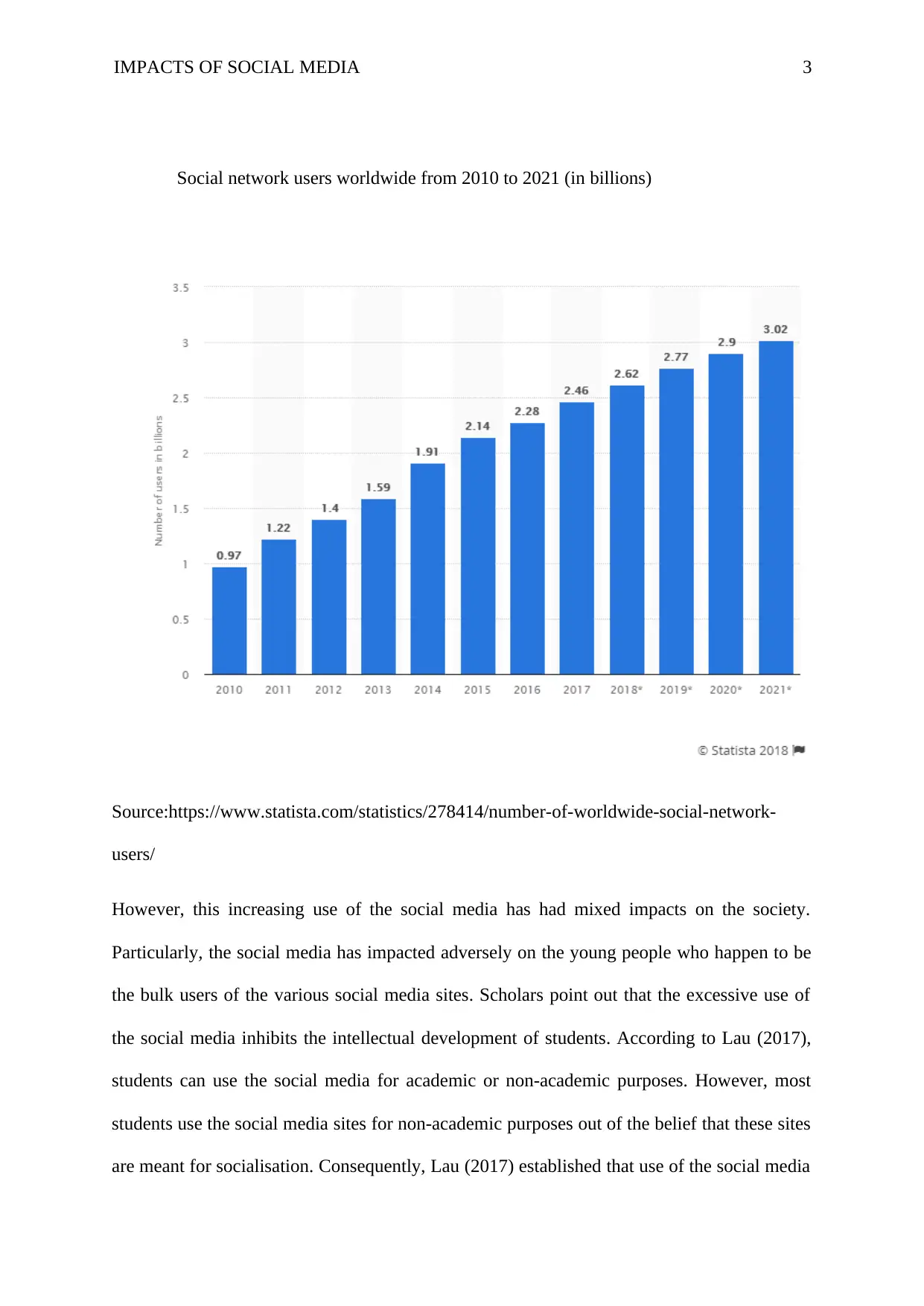
IMPACTS OF SOCIAL MEDIA 3
Social network users worldwide from 2010 to 2021 (in billions)
Source:https://www.statista.com/statistics/278414/number-of-worldwide-social-network-
users/
However, this increasing use of the social media has had mixed impacts on the society.
Particularly, the social media has impacted adversely on the young people who happen to be
the bulk users of the various social media sites. Scholars point out that the excessive use of
the social media inhibits the intellectual development of students. According to Lau (2017),
students can use the social media for academic or non-academic purposes. However, most
students use the social media sites for non-academic purposes out of the belief that these sites
are meant for socialisation. Consequently, Lau (2017) established that use of the social media
Social network users worldwide from 2010 to 2021 (in billions)
Source:https://www.statista.com/statistics/278414/number-of-worldwide-social-network-
users/
However, this increasing use of the social media has had mixed impacts on the society.
Particularly, the social media has impacted adversely on the young people who happen to be
the bulk users of the various social media sites. Scholars point out that the excessive use of
the social media inhibits the intellectual development of students. According to Lau (2017),
students can use the social media for academic or non-academic purposes. However, most
students use the social media sites for non-academic purposes out of the belief that these sites
are meant for socialisation. Consequently, Lau (2017) established that use of the social media
⊘ This is a preview!⊘
Do you want full access?
Subscribe today to unlock all pages.

Trusted by 1+ million students worldwide
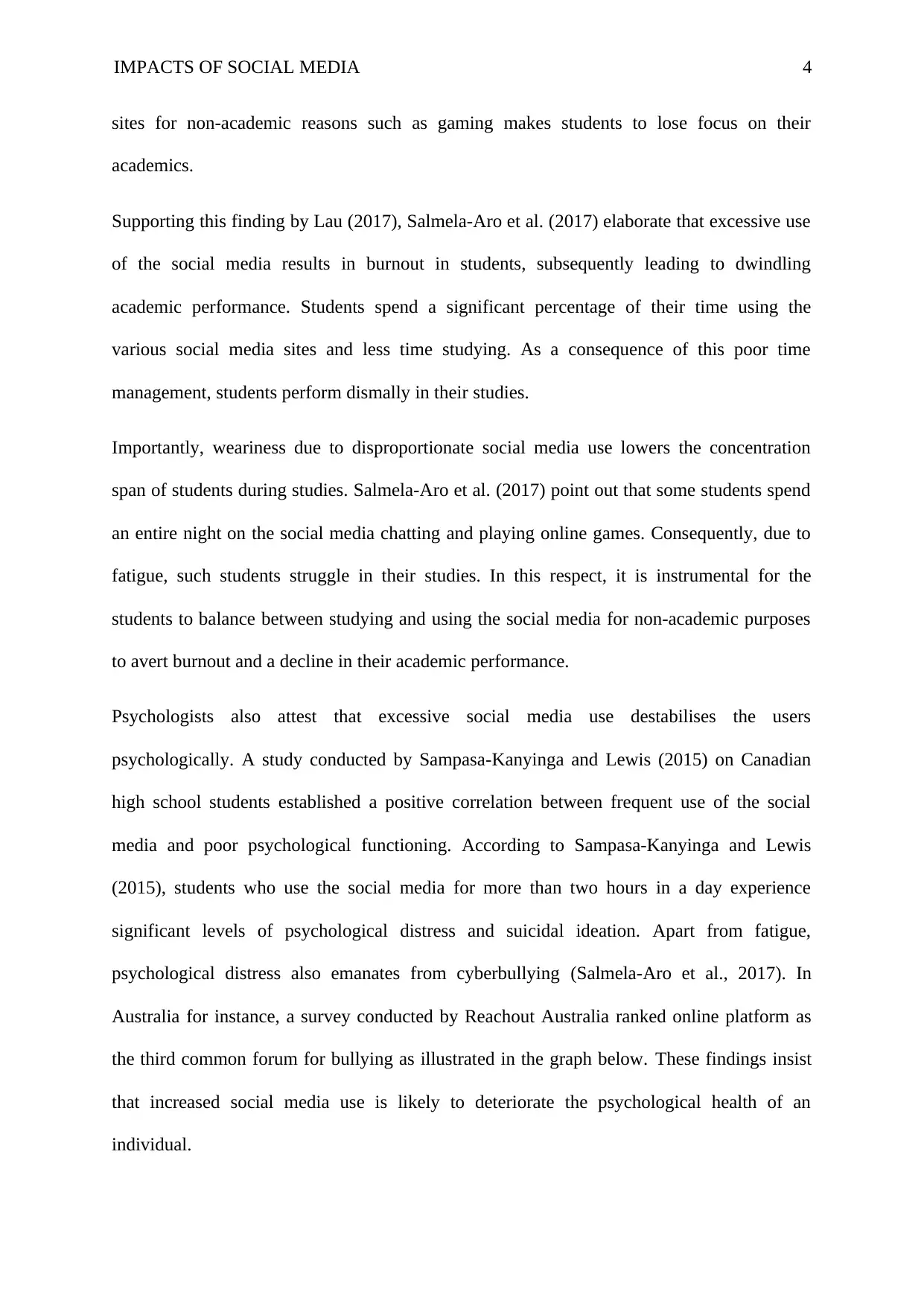
IMPACTS OF SOCIAL MEDIA 4
sites for non-academic reasons such as gaming makes students to lose focus on their
academics.
Supporting this finding by Lau (2017), Salmela-Aro et al. (2017) elaborate that excessive use
of the social media results in burnout in students, subsequently leading to dwindling
academic performance. Students spend a significant percentage of their time using the
various social media sites and less time studying. As a consequence of this poor time
management, students perform dismally in their studies.
Importantly, weariness due to disproportionate social media use lowers the concentration
span of students during studies. Salmela-Aro et al. (2017) point out that some students spend
an entire night on the social media chatting and playing online games. Consequently, due to
fatigue, such students struggle in their studies. In this respect, it is instrumental for the
students to balance between studying and using the social media for non-academic purposes
to avert burnout and a decline in their academic performance.
Psychologists also attest that excessive social media use destabilises the users
psychologically. A study conducted by Sampasa-Kanyinga and Lewis (2015) on Canadian
high school students established a positive correlation between frequent use of the social
media and poor psychological functioning. According to Sampasa-Kanyinga and Lewis
(2015), students who use the social media for more than two hours in a day experience
significant levels of psychological distress and suicidal ideation. Apart from fatigue,
psychological distress also emanates from cyberbullying (Salmela-Aro et al., 2017). In
Australia for instance, a survey conducted by Reachout Australia ranked online platform as
the third common forum for bullying as illustrated in the graph below. These findings insist
that increased social media use is likely to deteriorate the psychological health of an
individual.
sites for non-academic reasons such as gaming makes students to lose focus on their
academics.
Supporting this finding by Lau (2017), Salmela-Aro et al. (2017) elaborate that excessive use
of the social media results in burnout in students, subsequently leading to dwindling
academic performance. Students spend a significant percentage of their time using the
various social media sites and less time studying. As a consequence of this poor time
management, students perform dismally in their studies.
Importantly, weariness due to disproportionate social media use lowers the concentration
span of students during studies. Salmela-Aro et al. (2017) point out that some students spend
an entire night on the social media chatting and playing online games. Consequently, due to
fatigue, such students struggle in their studies. In this respect, it is instrumental for the
students to balance between studying and using the social media for non-academic purposes
to avert burnout and a decline in their academic performance.
Psychologists also attest that excessive social media use destabilises the users
psychologically. A study conducted by Sampasa-Kanyinga and Lewis (2015) on Canadian
high school students established a positive correlation between frequent use of the social
media and poor psychological functioning. According to Sampasa-Kanyinga and Lewis
(2015), students who use the social media for more than two hours in a day experience
significant levels of psychological distress and suicidal ideation. Apart from fatigue,
psychological distress also emanates from cyberbullying (Salmela-Aro et al., 2017). In
Australia for instance, a survey conducted by Reachout Australia ranked online platform as
the third common forum for bullying as illustrated in the graph below. These findings insist
that increased social media use is likely to deteriorate the psychological health of an
individual.
Paraphrase This Document
Need a fresh take? Get an instant paraphrase of this document with our AI Paraphraser
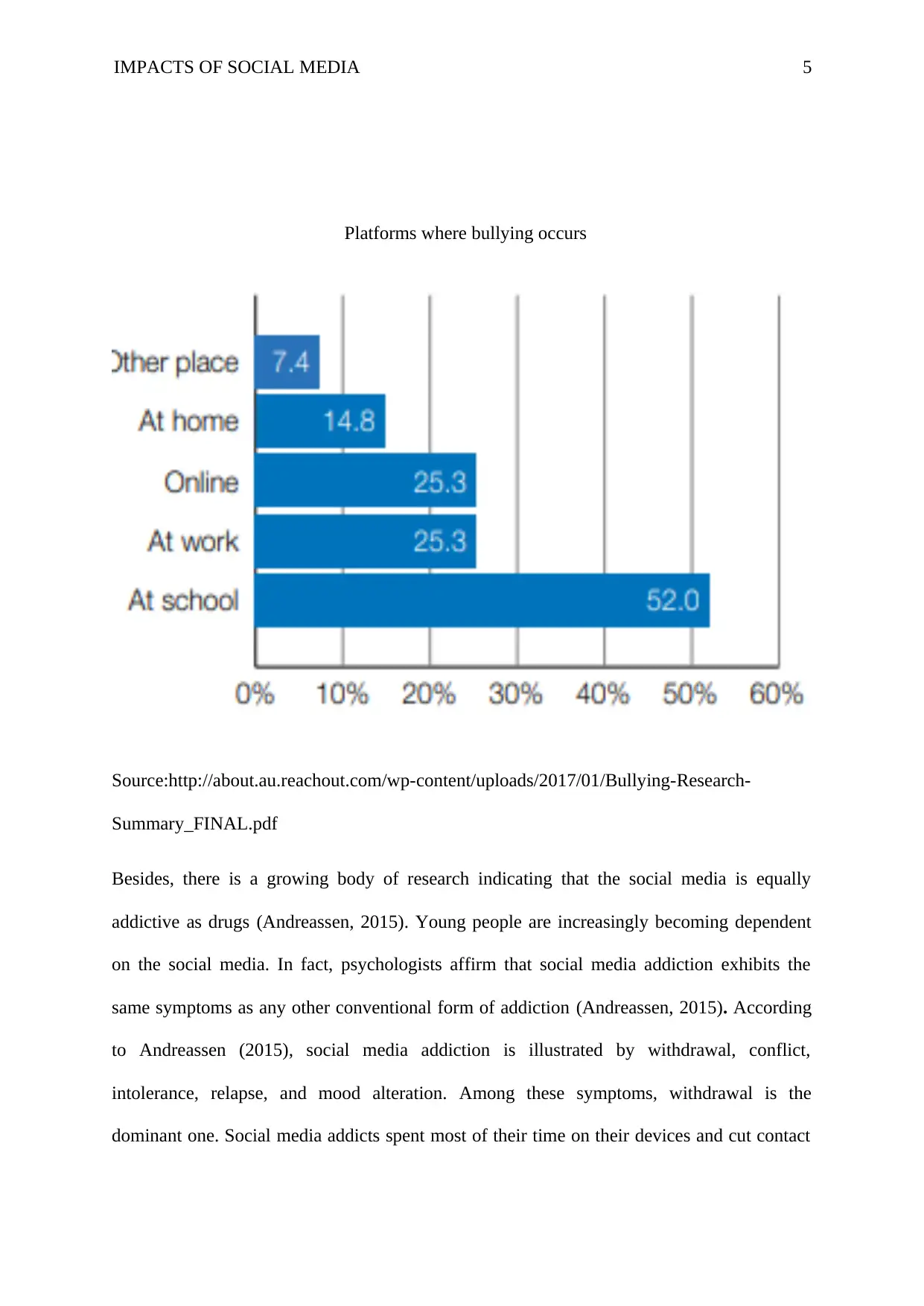
IMPACTS OF SOCIAL MEDIA 5
Platforms where bullying occurs
Source:http://about.au.reachout.com/wp-content/uploads/2017/01/Bullying-Research-
Summary_FINAL.pdf
Besides, there is a growing body of research indicating that the social media is equally
addictive as drugs (Andreassen, 2015). Young people are increasingly becoming dependent
on the social media. In fact, psychologists affirm that social media addiction exhibits the
same symptoms as any other conventional form of addiction (Andreassen, 2015). According
to Andreassen (2015), social media addiction is illustrated by withdrawal, conflict,
intolerance, relapse, and mood alteration. Among these symptoms, withdrawal is the
dominant one. Social media addicts spent most of their time on their devices and cut contact
Platforms where bullying occurs
Source:http://about.au.reachout.com/wp-content/uploads/2017/01/Bullying-Research-
Summary_FINAL.pdf
Besides, there is a growing body of research indicating that the social media is equally
addictive as drugs (Andreassen, 2015). Young people are increasingly becoming dependent
on the social media. In fact, psychologists affirm that social media addiction exhibits the
same symptoms as any other conventional form of addiction (Andreassen, 2015). According
to Andreassen (2015), social media addiction is illustrated by withdrawal, conflict,
intolerance, relapse, and mood alteration. Among these symptoms, withdrawal is the
dominant one. Social media addicts spent most of their time on their devices and cut contact
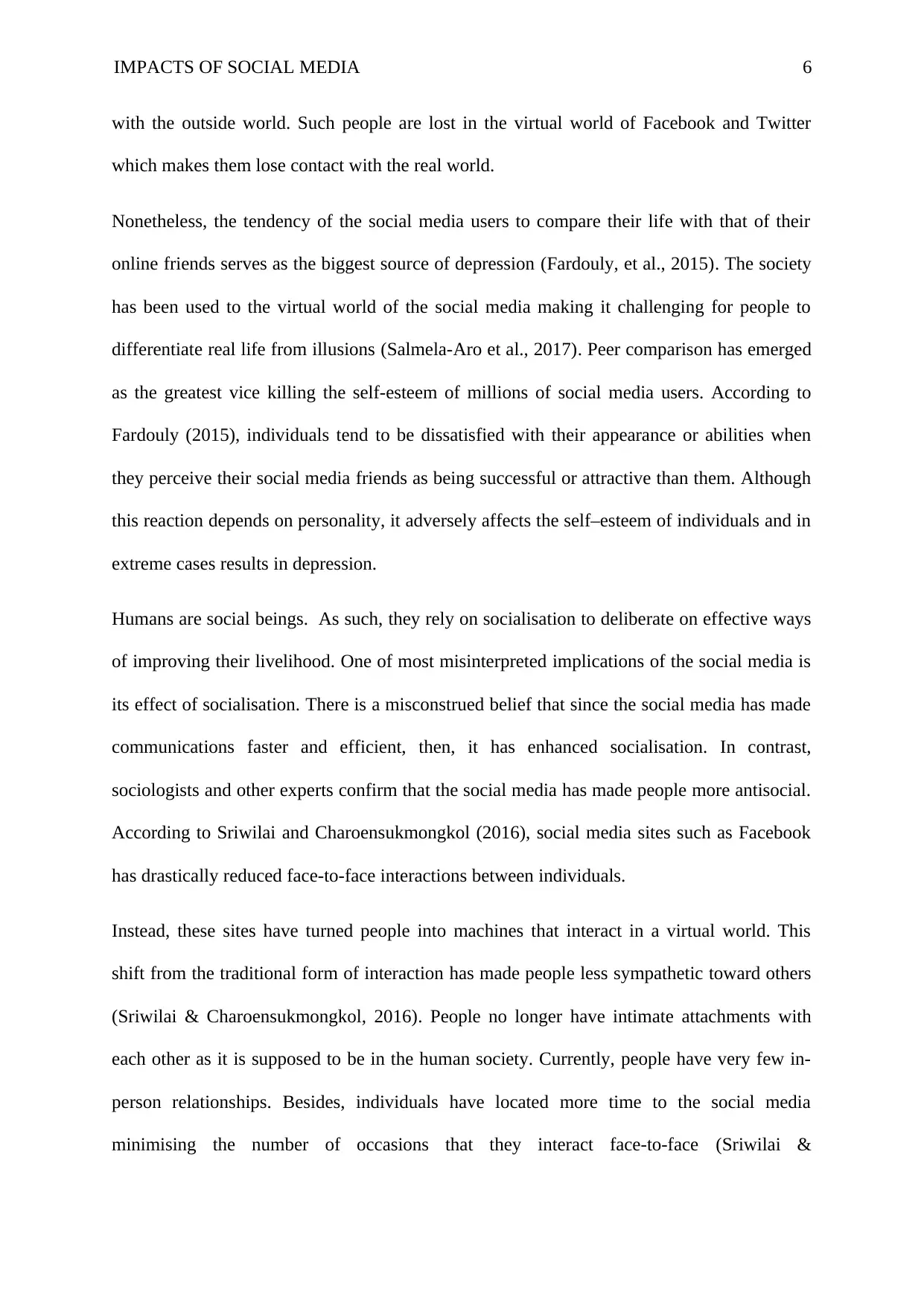
IMPACTS OF SOCIAL MEDIA 6
with the outside world. Such people are lost in the virtual world of Facebook and Twitter
which makes them lose contact with the real world.
Nonetheless, the tendency of the social media users to compare their life with that of their
online friends serves as the biggest source of depression (Fardouly, et al., 2015). The society
has been used to the virtual world of the social media making it challenging for people to
differentiate real life from illusions (Salmela-Aro et al., 2017). Peer comparison has emerged
as the greatest vice killing the self-esteem of millions of social media users. According to
Fardouly (2015), individuals tend to be dissatisfied with their appearance or abilities when
they perceive their social media friends as being successful or attractive than them. Although
this reaction depends on personality, it adversely affects the self–esteem of individuals and in
extreme cases results in depression.
Humans are social beings. As such, they rely on socialisation to deliberate on effective ways
of improving their livelihood. One of most misinterpreted implications of the social media is
its effect of socialisation. There is a misconstrued belief that since the social media has made
communications faster and efficient, then, it has enhanced socialisation. In contrast,
sociologists and other experts confirm that the social media has made people more antisocial.
According to Sriwilai and Charoensukmongkol (2016), social media sites such as Facebook
has drastically reduced face-to-face interactions between individuals.
Instead, these sites have turned people into machines that interact in a virtual world. This
shift from the traditional form of interaction has made people less sympathetic toward others
(Sriwilai & Charoensukmongkol, 2016). People no longer have intimate attachments with
each other as it is supposed to be in the human society. Currently, people have very few in-
person relationships. Besides, individuals have located more time to the social media
minimising the number of occasions that they interact face-to-face (Sriwilai &
with the outside world. Such people are lost in the virtual world of Facebook and Twitter
which makes them lose contact with the real world.
Nonetheless, the tendency of the social media users to compare their life with that of their
online friends serves as the biggest source of depression (Fardouly, et al., 2015). The society
has been used to the virtual world of the social media making it challenging for people to
differentiate real life from illusions (Salmela-Aro et al., 2017). Peer comparison has emerged
as the greatest vice killing the self-esteem of millions of social media users. According to
Fardouly (2015), individuals tend to be dissatisfied with their appearance or abilities when
they perceive their social media friends as being successful or attractive than them. Although
this reaction depends on personality, it adversely affects the self–esteem of individuals and in
extreme cases results in depression.
Humans are social beings. As such, they rely on socialisation to deliberate on effective ways
of improving their livelihood. One of most misinterpreted implications of the social media is
its effect of socialisation. There is a misconstrued belief that since the social media has made
communications faster and efficient, then, it has enhanced socialisation. In contrast,
sociologists and other experts confirm that the social media has made people more antisocial.
According to Sriwilai and Charoensukmongkol (2016), social media sites such as Facebook
has drastically reduced face-to-face interactions between individuals.
Instead, these sites have turned people into machines that interact in a virtual world. This
shift from the traditional form of interaction has made people less sympathetic toward others
(Sriwilai & Charoensukmongkol, 2016). People no longer have intimate attachments with
each other as it is supposed to be in the human society. Currently, people have very few in-
person relationships. Besides, individuals have located more time to the social media
minimising the number of occasions that they interact face-to-face (Sriwilai &
⊘ This is a preview!⊘
Do you want full access?
Subscribe today to unlock all pages.

Trusted by 1+ million students worldwide
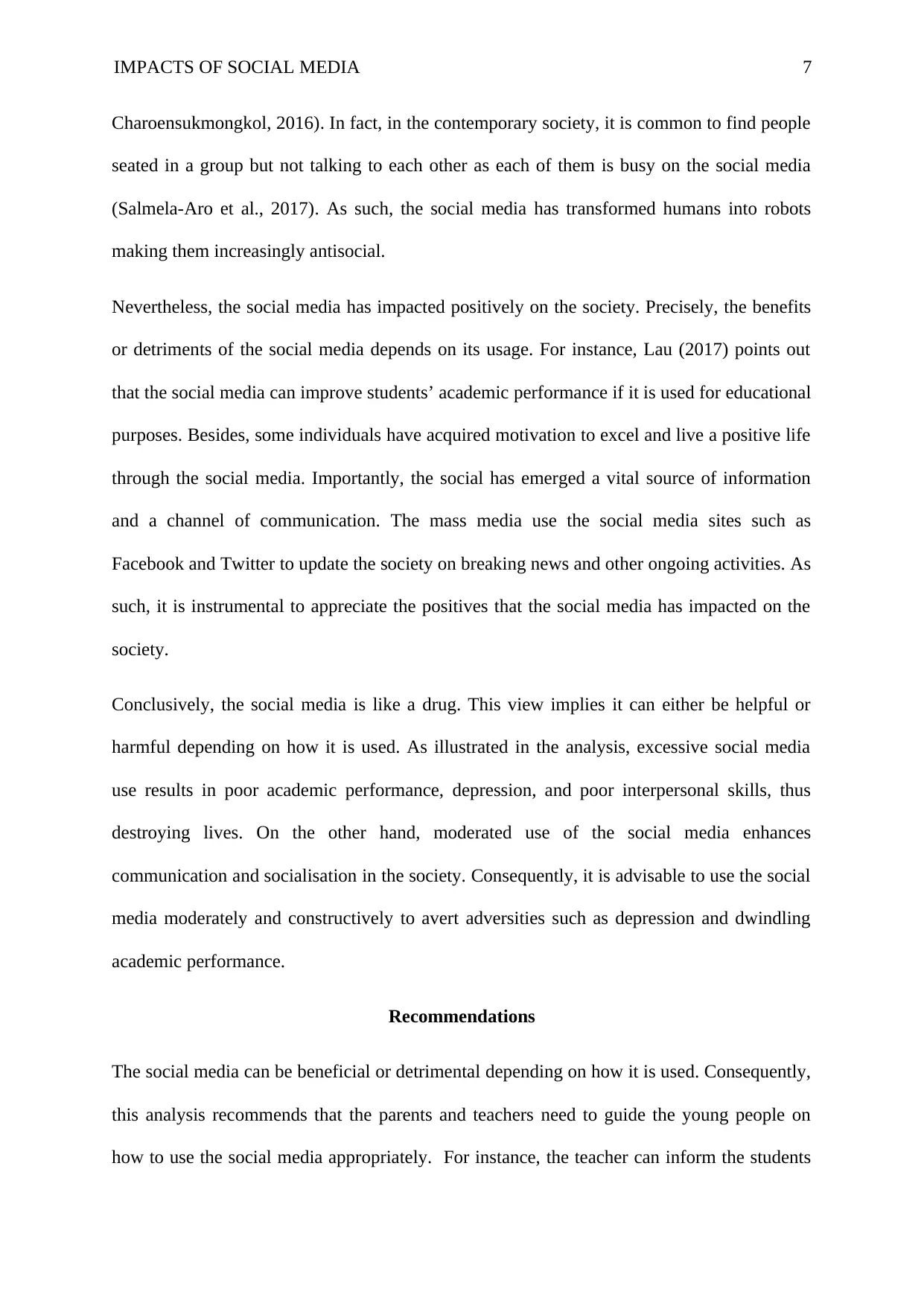
IMPACTS OF SOCIAL MEDIA 7
Charoensukmongkol, 2016). In fact, in the contemporary society, it is common to find people
seated in a group but not talking to each other as each of them is busy on the social media
(Salmela-Aro et al., 2017). As such, the social media has transformed humans into robots
making them increasingly antisocial.
Nevertheless, the social media has impacted positively on the society. Precisely, the benefits
or detriments of the social media depends on its usage. For instance, Lau (2017) points out
that the social media can improve students’ academic performance if it is used for educational
purposes. Besides, some individuals have acquired motivation to excel and live a positive life
through the social media. Importantly, the social has emerged a vital source of information
and a channel of communication. The mass media use the social media sites such as
Facebook and Twitter to update the society on breaking news and other ongoing activities. As
such, it is instrumental to appreciate the positives that the social media has impacted on the
society.
Conclusively, the social media is like a drug. This view implies it can either be helpful or
harmful depending on how it is used. As illustrated in the analysis, excessive social media
use results in poor academic performance, depression, and poor interpersonal skills, thus
destroying lives. On the other hand, moderated use of the social media enhances
communication and socialisation in the society. Consequently, it is advisable to use the social
media moderately and constructively to avert adversities such as depression and dwindling
academic performance.
Recommendations
The social media can be beneficial or detrimental depending on how it is used. Consequently,
this analysis recommends that the parents and teachers need to guide the young people on
how to use the social media appropriately. For instance, the teacher can inform the students
Charoensukmongkol, 2016). In fact, in the contemporary society, it is common to find people
seated in a group but not talking to each other as each of them is busy on the social media
(Salmela-Aro et al., 2017). As such, the social media has transformed humans into robots
making them increasingly antisocial.
Nevertheless, the social media has impacted positively on the society. Precisely, the benefits
or detriments of the social media depends on its usage. For instance, Lau (2017) points out
that the social media can improve students’ academic performance if it is used for educational
purposes. Besides, some individuals have acquired motivation to excel and live a positive life
through the social media. Importantly, the social has emerged a vital source of information
and a channel of communication. The mass media use the social media sites such as
Facebook and Twitter to update the society on breaking news and other ongoing activities. As
such, it is instrumental to appreciate the positives that the social media has impacted on the
society.
Conclusively, the social media is like a drug. This view implies it can either be helpful or
harmful depending on how it is used. As illustrated in the analysis, excessive social media
use results in poor academic performance, depression, and poor interpersonal skills, thus
destroying lives. On the other hand, moderated use of the social media enhances
communication and socialisation in the society. Consequently, it is advisable to use the social
media moderately and constructively to avert adversities such as depression and dwindling
academic performance.
Recommendations
The social media can be beneficial or detrimental depending on how it is used. Consequently,
this analysis recommends that the parents and teachers need to guide the young people on
how to use the social media appropriately. For instance, the teacher can inform the students
Paraphrase This Document
Need a fresh take? Get an instant paraphrase of this document with our AI Paraphraser
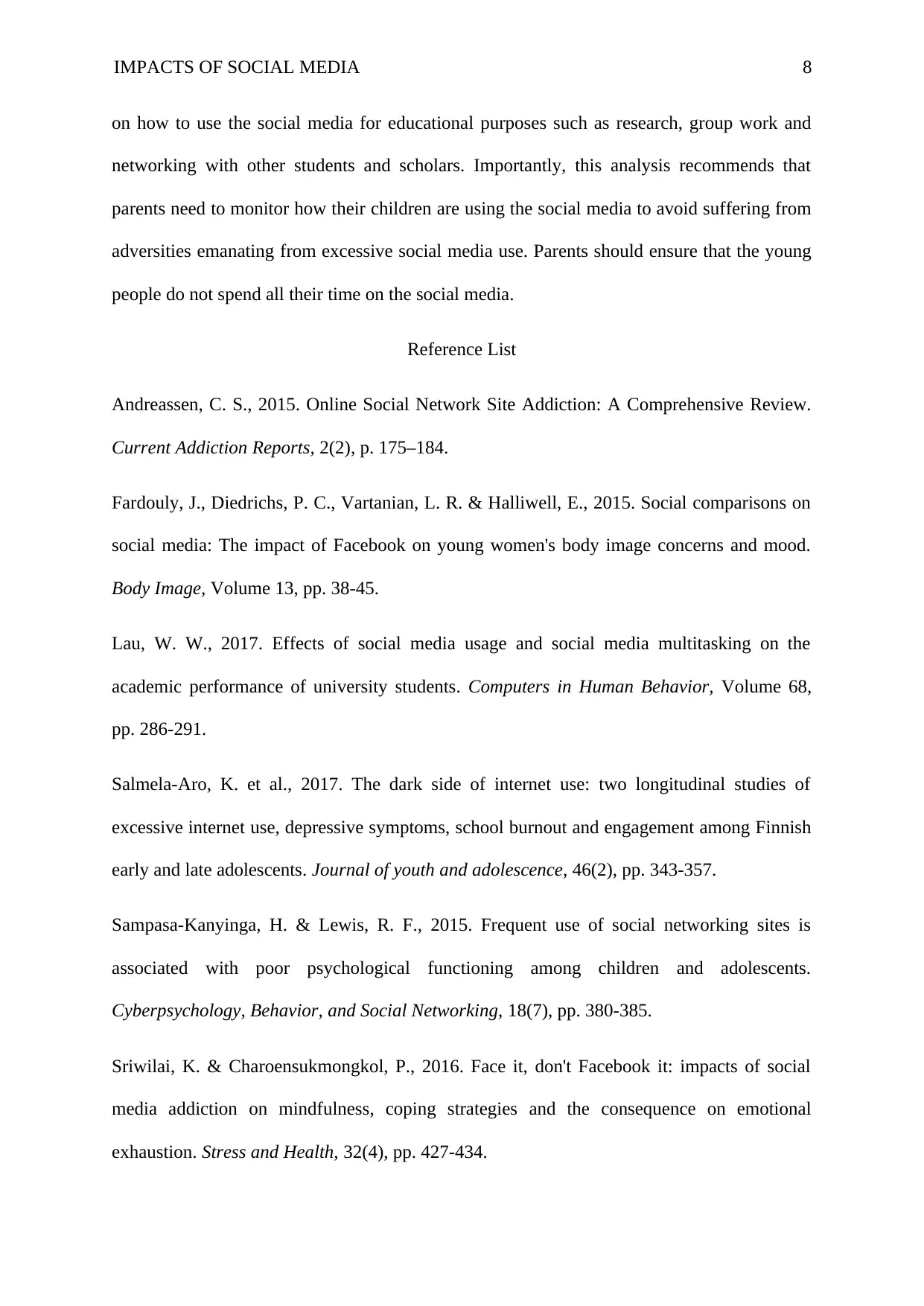
IMPACTS OF SOCIAL MEDIA 8
on how to use the social media for educational purposes such as research, group work and
networking with other students and scholars. Importantly, this analysis recommends that
parents need to monitor how their children are using the social media to avoid suffering from
adversities emanating from excessive social media use. Parents should ensure that the young
people do not spend all their time on the social media.
Reference List
Andreassen, C. S., 2015. Online Social Network Site Addiction: A Comprehensive Review.
Current Addiction Reports, 2(2), p. 175–184.
Fardouly, J., Diedrichs, P. C., Vartanian, L. R. & Halliwell, E., 2015. Social comparisons on
social media: The impact of Facebook on young women's body image concerns and mood.
Body Image, Volume 13, pp. 38-45.
Lau, W. W., 2017. Effects of social media usage and social media multitasking on the
academic performance of university students. Computers in Human Behavior, Volume 68,
pp. 286-291.
Salmela-Aro, K. et al., 2017. The dark side of internet use: two longitudinal studies of
excessive internet use, depressive symptoms, school burnout and engagement among Finnish
early and late adolescents. Journal of youth and adolescence, 46(2), pp. 343-357.
Sampasa-Kanyinga, H. & Lewis, R. F., 2015. Frequent use of social networking sites is
associated with poor psychological functioning among children and adolescents.
Cyberpsychology, Behavior, and Social Networking, 18(7), pp. 380-385.
Sriwilai, K. & Charoensukmongkol, P., 2016. Face it, don't Facebook it: impacts of social
media addiction on mindfulness, coping strategies and the consequence on emotional
exhaustion. Stress and Health, 32(4), pp. 427-434.
on how to use the social media for educational purposes such as research, group work and
networking with other students and scholars. Importantly, this analysis recommends that
parents need to monitor how their children are using the social media to avoid suffering from
adversities emanating from excessive social media use. Parents should ensure that the young
people do not spend all their time on the social media.
Reference List
Andreassen, C. S., 2015. Online Social Network Site Addiction: A Comprehensive Review.
Current Addiction Reports, 2(2), p. 175–184.
Fardouly, J., Diedrichs, P. C., Vartanian, L. R. & Halliwell, E., 2015. Social comparisons on
social media: The impact of Facebook on young women's body image concerns and mood.
Body Image, Volume 13, pp. 38-45.
Lau, W. W., 2017. Effects of social media usage and social media multitasking on the
academic performance of university students. Computers in Human Behavior, Volume 68,
pp. 286-291.
Salmela-Aro, K. et al., 2017. The dark side of internet use: two longitudinal studies of
excessive internet use, depressive symptoms, school burnout and engagement among Finnish
early and late adolescents. Journal of youth and adolescence, 46(2), pp. 343-357.
Sampasa-Kanyinga, H. & Lewis, R. F., 2015. Frequent use of social networking sites is
associated with poor psychological functioning among children and adolescents.
Cyberpsychology, Behavior, and Social Networking, 18(7), pp. 380-385.
Sriwilai, K. & Charoensukmongkol, P., 2016. Face it, don't Facebook it: impacts of social
media addiction on mindfulness, coping strategies and the consequence on emotional
exhaustion. Stress and Health, 32(4), pp. 427-434.
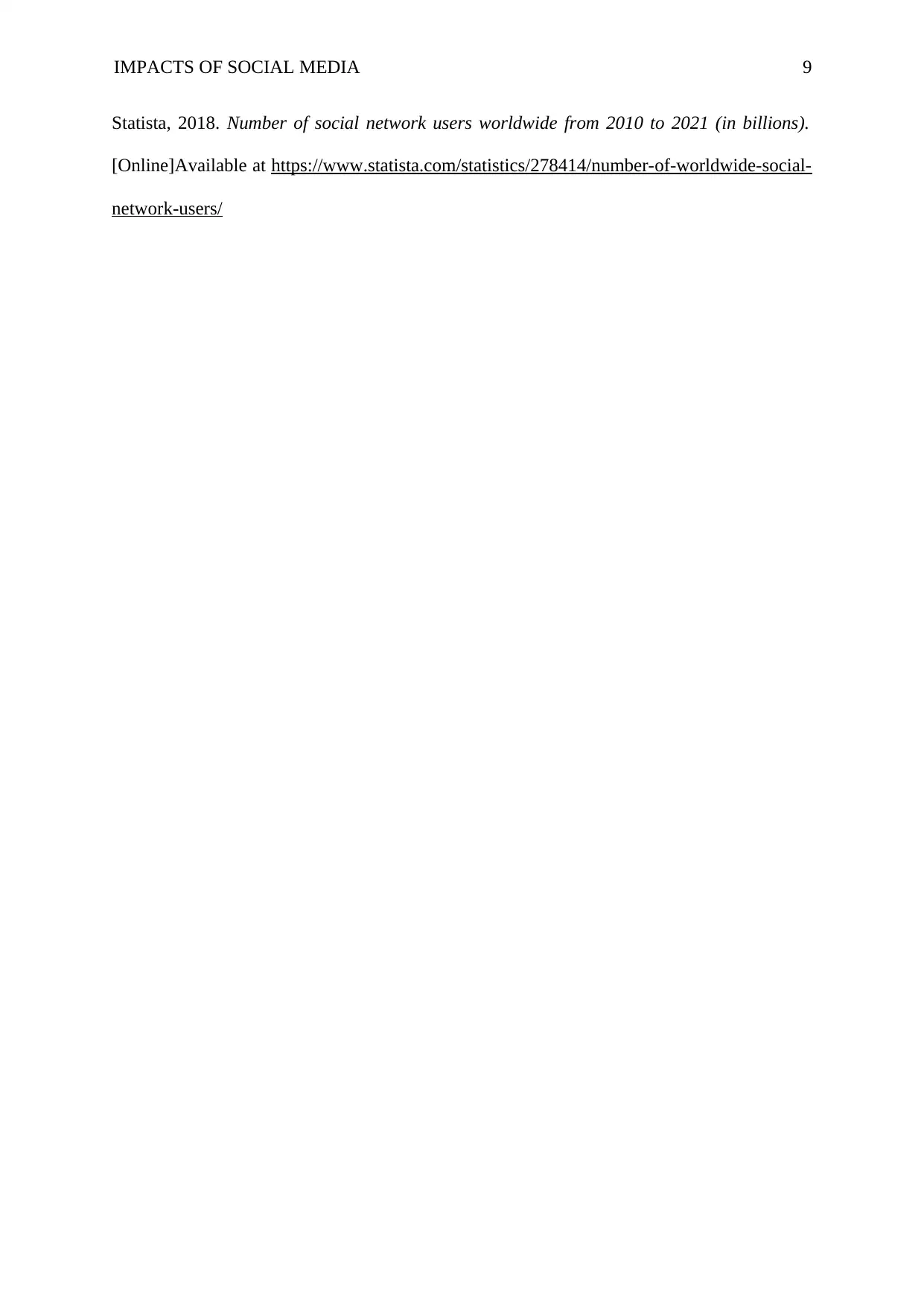
IMPACTS OF SOCIAL MEDIA 9
Statista, 2018. Number of social network users worldwide from 2010 to 2021 (in billions).
[Online]Available at https://www.statista.com/statistics/278414/number-of-worldwide-social-
network-users/
Statista, 2018. Number of social network users worldwide from 2010 to 2021 (in billions).
[Online]Available at https://www.statista.com/statistics/278414/number-of-worldwide-social-
network-users/
⊘ This is a preview!⊘
Do you want full access?
Subscribe today to unlock all pages.

Trusted by 1+ million students worldwide
1 out of 9
Related Documents
Your All-in-One AI-Powered Toolkit for Academic Success.
+13062052269
info@desklib.com
Available 24*7 on WhatsApp / Email
![[object Object]](/_next/static/media/star-bottom.7253800d.svg)
Unlock your academic potential
Copyright © 2020–2025 A2Z Services. All Rights Reserved. Developed and managed by ZUCOL.





